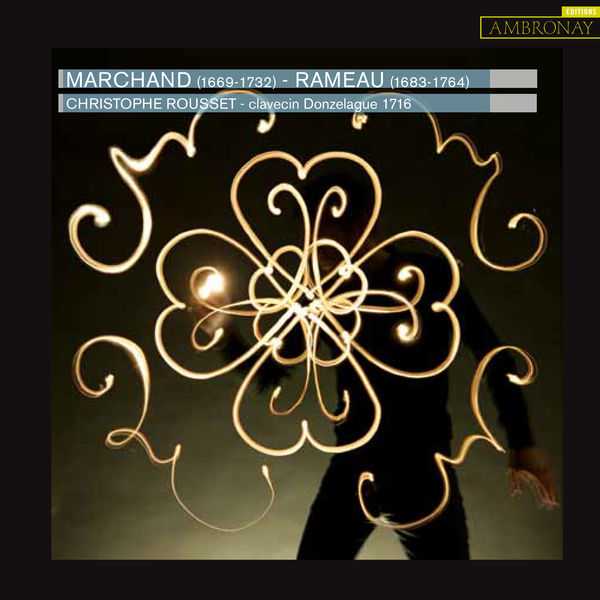
Composer: Louis Marchand, Jean Philippe Rameau
Performer: Christophe Rousset
Format: FLAC (tracks)
Label: Ambronay
Catalogue: AMY032
Release: 2012
Size: 1.23 GB
Recovery: +3%
Scan: yes
Marchand: Suite en ré, Premier Livre
01. I. Prélude
02. II. Allemande
03. III. Courante I
04. IV. Courante II
05. V. Sarabande
06. VI. Gigue
07. VII. Chaconne
08. VIII. Gavotte
09. IX. Menuet
Marchand: Suite en sol, Deuxieme Livre
10. I. Prélude
11. II. Allemande
12. III. Courante
13. IV. Sarabande
14. V. Gigue
15. VI. Gavotte
16. VII. Menuet I
17. VIII. Menuet II
Marchand: Trois Pièces
18. I. Vénitienne
19. II. La badine
20. III. Gavotte
Rameau: Suite en la, Premier Livre
21. I. Prélude
22. II. Allemande I
23. III. Allemande II
24. IV. Courante
25. V. Gigue
26. VI. Sarabande I
27. VII. Sarabande II
28. VIII. Vénitienne
29. IX. Gavotte
30. X. Menuet
“Louis Marchand is the French composer who has entered legend for a musical duel with J. S. Bach which he is supposed finally to have dodged. But to make one’s mark on posterity that way is a sad comedown for so eminent a composer of organ and harpsichord music. Although he died in the reign of Louis XV, he retained in his style a nobility of tone wholly typical of the age of Louis XIV.
The conception of harpsichord sound in Marchand is much closer to d’Anglebert than to Rameau. Like his predecessor, he employs a profusion of ornaments which considerably enrich the sustaining power of the sound and mean that a string is kept constantly in vibration. He uses the medium-low register in preference to the treble, thus bringing the harpsichord closer to the theorbo or the bass viol. Rameau, for his part, immediately imposes his new and revolutionary conception of music. Everything here breathes harmony. The discourse is always deliberately clear, favouring transparency over the bombastic effects of a more sensual harpsichord sound. The link that inspired me to choose this programme for the sumptuous Donzelague harpsichord, which, it may be recalled, was only just saved for the nation when I was still a student with Huguette Dreyfus (I can still remember the inaugural concert at the Salle Gaveau where my teacher played Rameau on it, among others) is, of course the city of Lyon. Donzelague built his instruments in Lyon; Marchand was born and studied the organ with his father there. Rameau lived in Lyon for a period in 1713, composing his grands motets there. During his brief stay in Paris in 1706, he took up residence opposite the Church of the Cordeliers where Marchand just happened to be organist at the time, and attempted to solicit the favour of the Parisian public by publishing his first opus at so early an age.
This Donzelague harpsichord, like the instruments by Nicolas Dumont from the early years of the 18nth century, is extended down to the low F, thus abandoning the 17th-century French tradition of the G’-B short octave. Hence it allows the music on the present recording to sound in its full sonic and declamatory amplitude.”
Christophe Rousset